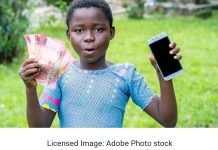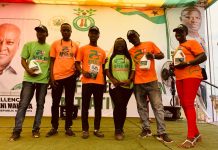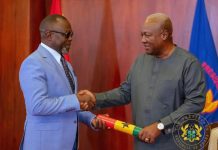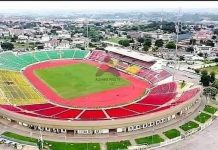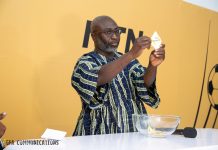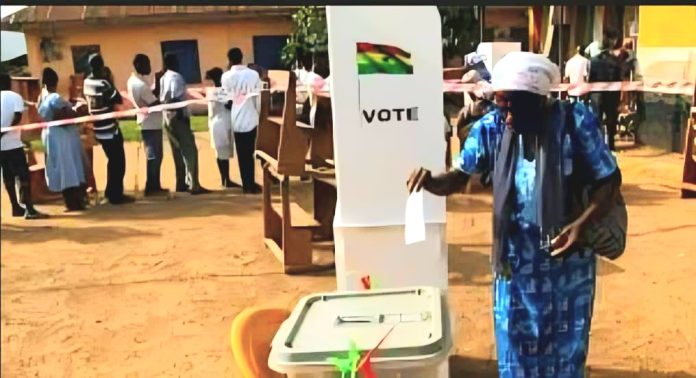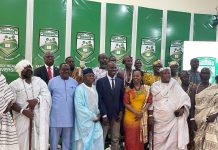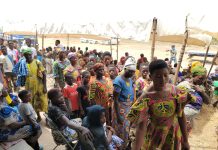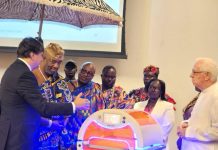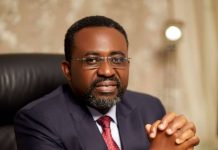December 6, 2024 – Accra: The National Peace Council (NPC) and the West Africa Network for Peacebuilding (WANEP) launched the Election Situation Room (ESR) today at the Movenpick Ambassador Hotel, Accra in a joint appeal for peaceful Presidential and Parliamentary elections scheduled for tomorrow Saturday December 7, 2024.
The initiative is supported by the European Union (EU), the United States Agency for International Development (USAID), and additional funding from the Governments of Sweden, Austria, and the United Kingdom.
A Coordinated Approach to Peaceful Elections
The ESR is a critical component of the Electoral Violence Monitoring, Analysis, and Mitigation (E-MAM) project.
This initiative is part of a broader effort to mitigate election-related violence across 12 West African countries using National Early Warning Systems (NEWS).
Since May 2024, NPC and WANEP, in partnership with ECOWAS, the ECOWAS Network of Electoral Commissions (ECONEC), and the United Nations Office for West Africa and the Sahel (UNOWAS), have launched the National Election Response Group (NERG) and Regional Election Response Group (RERG).
These groups are tasked with addressing potential threats to peaceful elections through dialogue and strategic interventions.
NERG and RERG bring together prominent individuals from state and non-state institutions to collaboratively prevent and mitigate electoral violence.
This underscores NPC and WANEP’s commitment to fostering peace, security, and successful elections in Ghana.
Operations of the Election Situation Room
From December 6 to 8, 2024, the ESR will operate out of the Movenpick Ambassador Hotel in Accra, supported by regional response groups in 11 high-priority regions identified through earlier threat analyses.
These regions include Upper East, Upper West, Northern, North-East, Savannah, Bono, Bono-East, Ashanti, Greater Accra, Western, and Volta.
The ESR’s responsibilities include:
– Monitoring and reporting on electoral threats
– Analyzing data
– Facilitating timely responses to potential violence
A team of 134 personnel, including youth, women, election experts, and eminent persons, will oversee the ESR’s five operational sections: Data Gathering Room, Analysis Room, Decision Room, Fact-checking Room, and Communication Room.
Additionally, Fact-checkers from the Centre for Journalism Innovation and Development (CJID) and West Africa Fact-Space will validate reports before they are released to the public.
Deployment of Observers
A total of 510 accredited observers have been deployed, with 319 from WANEP covering 276 high-risk constituencies and 191 from NPC across all regions. These observers—comprising 370 males (72.55%) and 140 females (27.45%)—will use a comprehensive 63-question checklist to monitor voting processes. Reports will be submitted via a specialized Geospatial Information System (GIS), WhatsApp channels, and direct phone calls.
Electoral Context and Preparations
On December 7, 2024, an estimated 18,774,159 registered voters—9,689,980 females (51.6%) and 9,084,179 males (48.4%)—will cast their votes in 40,976 polling stations nationwide.
The number of polling stations represents a 22.81% increase from 2020, aimed at reducing congestion and enhancing efficiency.
The Electoral Commission (EC) has undertaken extensive preparations, including limited voter registration, voter roll updates, certification of candidates, and distribution of electoral materials.
A total of 13 presidential candidates, including two females, are contesting, alongside 801 parliamentary candidates.
Security Arrangements
The National Election Security Taskforce, chaired by the Inspector General of Police, Dr. George Akuffo Dampare, has deployed personnel nationwide to ensure law and order. Comprising members from the Ghana Police Service, Armed Forces, and other agencies, the taskforce aims to address security concerns, including 7,250 identified flashpoints.
Challenges and Recommendations
Pre-election challenges include mistrust of state institutions, rising political intolerance, negative media reportage, and unresolved conflicts.
To address these, the ESR recommends:
– Enhanced communication from the EC with stakeholders and the public
– Upholding neutrality and professionalism by security forces
– Ethical journalism to combat misinformation and disinformation
– Verification of social media information by the public
– Observance of the political code of conduct by candidates
Commitment to Peace and Transparency
The ESR will issue opening and closing statements on election day, a preliminary statement on December 8, and a comprehensive report post-elections. NPC and WANEP invite stakeholders to engage with the ESR and reaffirm their dedication to peace and electoral integrity.
Acknowledgements:
The ESR extends its gratitude to the EU, USAID, and other partners, including the Swedish International Development Agency, Austrian Development Cooperation, and the UK Government.
Also find here the Full Statement:
Opening Statement
December 6, 2024 – Accra: The National Peace Council (NPC) and the West Africa Network for Peacebuilding (WANEP) is launching the Election Situation Room (ESR) and urges Ghanaians to have peaceful Presidential and Parliamentary elections on 7th December 2024.
The ESR, supported by the European Union and the United States Agency for International Development (USAID), and with complementary funding from the
Governments of Sweden, Austria and the United Kingdom.
The ESR is an integral part of the Electoral violence Monitoring, Analysis, and Mitigation (E-MAM) project which is designed to mitigate election violence in 12 West African countries through National Early Warning Systems (NEWS).
Since May 2024, NPC and WANEP, in partnership with the Economic Community of West African States (ECOWAS), the ECOWAS Network of Electoral Commissions (ECONEC) and United Nations Office for West Africa and the Sahel (UNOWAS), launched the National Election Response Group (NERG) and Regional Election Response Group (RERG).
The primary objective of NERG/RERG is to engage in discussions, develop response strategies, and recommend actions to address potential violent threats leading up to, during, and after the elections.
NERG/RERG consists of prominent individuals representing key state and non-state institutions to prevent and mitigate violence associated with elections.
This collaborative effort highlights NPC and WANEP’s commitment to promoting peace, security, and successful elections in Ghana by providing timely information and strategic response mechanisms.
From December 6th to 8th, 2024, the NPC and WANEP will operate a centralised Election Situation Room at the Movenpick Ambassador Hotel in Accra.
The ESR, with support from RERGs established in 11 regions, namely, Upper East, Upper West, Northern, North-East, Savannah, Bono, Bono-East, Ashanti, Greater Accra, Western, and Volta, will undertake preventive actions across the country.
These 11 regions were selected on the basis of our threat analysis conducted earlier in the year.
The ESR monitors, reports, analyses, and facilitates responses to violent threats to the peaceful conduct of the Presidential and Parliamentary elections.
Five Hundred and Ten (510) accredited observers, including 319 observers from WANEP, have been deployed mainly to 276 prioritised “very high-risk” to “Medium-risk” constituencies across Ghana’s 16 regions (refer to the deployment map below), and 191 observers deployed by NPC across all the regions.
Out of the 510 observers, 370 (72.55%) are males and 140 (27.45%) are females.
These observers will use a checklist comprising 63 questions, divided into six forms, to monitor voting processes within their assigned areas.
Reports will be submitted through a Geospatial Information System (GIS) designed for this purpose.
Additional updates will be received via dedicated WhatsApp channels and phone calls between the situation room and field observers.
The ESR comprises five operational sections: the Data Gathering Room, Analysis Room, Decision Room, Fact-checking Room and Communication Room (refer to the ESR Explanatory Guide below).
For the next three days (6th, 7th and 8th December 2024), 134 personnel, including youth, women, elections experts, and eminent persons have been mobilised to operationalise the ESR with the support of resource persons from other West African countries.
In addition, a team of Fact-checkers from the Centre for Journalism Innovation and Development (CJID) and West Africa Fact-Space will support the ESR in validating sensitive incidents and other social media posts before being released to the public.
Pre-Elections Context
On Saturday, 7 December 2024, 18,774,159 registered Ghanaians, comprising 9,689,980 (51.6%) females and 9,084,179 (48.4%) males, are expected to go to the polls for the ninth presidential and parliamentary elections under the Fourth Republic.
Out of 24 applicants for presidential candidate, 13 were accredited by the Electoral Commission to contest the elections.
These include two females: Akua Donkor (Ghana Freedom Party), who is deceased, but her image will remain on the ballot, and Nana Akosua Frimpomaa Sarpong Kumankuma of the Convention People’s Party.
In the parliamentary election, 801 aspirants, made up of 119 (14.8%) females and 682 (85.1%) males, will contest in 276 Constituencies.
The elections will be held in all 40,976 polling stations across the country.
The number of polling stations in Ghana has increased by approximately 22.81% compared to the 2020 elections.
According to the Electoral Commission (EC), the increase is intended to reduce congestion at polling centres, ensuring accessibility and a more efficient voting process.
This initiative is aligned with the EC’s commitment to improving electoral efficiency and transparency.
Electoral Commission Preparation
The Electoral Commission reportedly undertook the following key activities in preparation for the 7th December 2024 elections:
• Limited voter registration;
• Compilation of voter register, exhibition and voter transfer processes;
• Certification of candidates and production/posting of notices of polls;
• Printing and distribution of ballot papers;
• Distribution of voter registers to political parties and candidates;
• Distribution of Biometric Verification Devices (BVDs) and other electoral materials;
Recruitment and training of polling station staff;
• Setting up of Constituency and Regional Collation Centres, and;
• Engagements with the political parties and independent candidates
through the Inter-party Advisory Committee (IPAC) on all relevant
issues.
Security Preparedness:
While the NPC and WANEP hotspot mapping reports identified 203 “Very-high to Medium Risk Areas nationwide based on our specific election security indicators, the EC has reportedly identified 7,250 flashpoints nationwide.
The National Election Security Taskforce led by the Ghana Police Service has deployed personnel nationwide to ensure law and public order before, during and after the 7 December polls.
The Election Security Taskforce is drawn from the Ghana Police Service, Ghana Armed Forces, Ghana Fire Service, Ghana Prisons Service, Ghana Immigration Service, Ghana Customs Division of the Ghana Revenue Authority and the National Intelligence Bureau, among others.
The Inspector General of the Ghana Police Service, Dr George Akuffo Dampare, who chairs the Election Security Taskforce, has assured the general public of the commitment and professionalism of personnel throughout the electoral process.
Challenges and Concerns for the Peaceful Conduct of the Elections
The following are some of the identified concerns and challenges from the pre-election period:
• An environment of mistrust and suspicions of key state institutions by a section of the citizenry
• Mistrust and suspicions among political actors;
• Negative media reportage and social media vulnerabilities, including information disorders;
• Protests and demonstrations over socio-economic conditions in the country;
• Rising political intolerance across the country; Violent confrontations and clashes between and among political parties.
• Unresolved conflicts and its implications for the peaceful conduct of the elections.
• The disqualification of presidential and parliamentary candidates
• Disputesfollowing the declaration of four vacant parliamentary seats
• Under representation of women and youth in politics
• The use of technology and the new media as tools for political mobilisation and spreading propaganda, hate speech, fake news,
misinformation, disinformation, mal-information, accusations,
counteraccusations, and violent communication by political parties
Recommendations
Given the challenges raised, the ESR recommends the following:
– The EC is encouraged to continue to maintain frequent communication with stakeholders and the general public throughout the electoral process.
– The National Election Security Taskforce is encouraged to continue to uphold the principles of neutrality, impartiality and professionalism in the discharge of their duties;
– The National Communication Authority, the Ghana Journalists Association and the National Media Commission should encourage their members to respect the ethics of the journalism profession and refrain from disseminating any information that could exacerbate tensions.
– The General Public should verify before sharing information on social media.
– Political actors should observe the provisions of the code of conduct of political parties and the 2024 Presidential and Parliamentary Peace Pacts.
Civil society and other election observer missions are encouraged to coordinate their observations toward a peaceful election process;
– We call on all stakeholders, especially the youth and political parties, to be tolerant of each other throughout the electoral process.
True to the ideals of peace and social cohesion, the ESR is committed to observing the ethics, integrity and transparency of the electoral process to prevent violence and human rights violations.
The ESR will make opening and closing statements on election day, a preliminary statement to the public on Sunday, 8th December 2024, and a general report at the end of the electoral process.
We also take this opportunity to invite stakeholders to visit and acquaint themselves with the ESR.
Finally, we appreciate the general support of our partners – the EU, USAID, the Swedish International Development Agency, Austrian Development
Cooperation, Government Communication Service-UK, and the Foreign, Commonwealth and Development Office via the British High Commission in Accra.
May God bless Ghana and make our nation great and strong.
Made in Accra, 6th December 2024
The Election Situation Room


